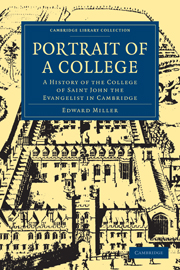V - THE PRE-WAR YEARS AND WAR-TIME (1882–1918)
Published online by Cambridge University Press: 07 September 2010
Summary
Bateson died on 27 March 1881 and soon ‘speculation was very rife as to the new master. In the event the choice of the fellows was Dr Charles Taylor. He had much in common with many of his predecessors. As an undergraduate his studies had been in mathematics and classics and he then proceeded in 1863 to a first class in the theological examination, presaging his future distinction as ‘one of the masters of Rabbinic learning’. He became a fellow in 1864, took orders in accordance with the statutes and served the college as lecturer in theology. At the same time, he had already displayed a capacity for affairs as well as scholarship before 1881. He served on the college committees considering the revision of the statutes in 1887–8 and, with Bateson and T. G. Bonney, was chosen in 1879 one of the representatives of St John's to deal on its behalf with the commissioners nominated in the act of 1877. From the beginning, therefore, ‘he found himself in the full current of an epoch of change’. He might have ‘no reforming tendencies of his own’ and ‘a short way with visionary and unpractical schemes’; but ‘he was always ready to support proposals for reform, provided they were well thought out’. Circumstances being what they were, proposals for reform were frequent enough from the beginning to the end of his time.
- Type
- Chapter
- Information
- Portrait of a CollegeA History of the College of Saint John the Evangelist in Cambridge, pp. 95 - 112Publisher: Cambridge University PressPrint publication year: 2009First published in: 1961

